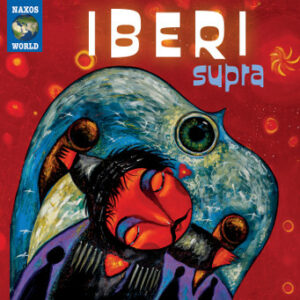 Spits je oren voor de Georgische groep Iberi, die met hun album Supra een mooie selectie Georgische polyfonie laat horen.
Spits je oren voor de Georgische groep Iberi, die met hun album Supra een mooie selectie Georgische polyfonie laat horen.
English version below
Het land Georgië ligt tussen de Zwarte en de Kaspische Zee met als hoofdstad Tbilisi. De Georgische polyfonie heeft een intense schoonheid, is karakteristiek en herkenbaar. Muziek, of eigenlijk de liederen, zitten verweven binnen de Georgische cultuur. Muziek is overal en er wordt van jongs af aan gezongen en gedanst. Werk- en oogstliederen, slaapliedjes, historische ballades, hedendaagse melodieën, tafel- en kerkliederen, het zit allemaal in het collectief geheugen van de Georgische bevolking. De muziek is over het algemeen drie-stemmig, waarbij de middenstem de hoofdmelodie zingt en de twee andere stemmen de 2-de en 3de stem erboven en eronder. Daarnaast bestaan er diverse stijlen binnen de Georgische muziek. Zo zijn de liederen uit het westen sneller, zijn de melodieën beweeglijker en worden ze hier en daar aangevuld met krimanchuli (soort jodelen). In het noorden, de Kaukasus, zijn de melodieën juist homofoon: waarbij elke stem in hetzelfde ritme zingt en de melodieën licht archaïsch kleuren. De zangers zingen zowel a-capella als onder begeleiding van gitaar, chonguri (vier-snarig langhals-luit) en de panduri (drie-snarige langhals-luit).
De negen zangeres van het Iberi koor staan onder leiding van zanger en voormalig rugbyspeler Buba Murguli. Het koor put uit de rijke Georgische zangtraditie en heeft een mooie selectie liederen met verschillende signatuur samengebracht op Supra. De stemmen van Iberi vormen één timbre, één harmonische kleur. Negen uitgekristaliseerde stemmen die elkaar subliem aanvullen, zowel in a-capella als liederen die worden begeleid op gitaar en panduri. Prachtig ingetogen zoals in Svanuri Nana: een homofoon gezongen slaapliedje. Bevlogen en met verve te horen in Harira: een religieuze melodie over het ontstaan van de aarde, dat eindigt in euforische voor- en nazang. In Varado, een lied over een gewonde man, en het religieuze Saeklesio Mravalzhamieri klinken de zgn. drones. De lang liggende bastonen die af toe dwars door de melodie heen snijden en dramatisch verhogend werken. Supra is een super-CD van Iberi; een woord dat letterlijk tafelkleed betekent en naadloos aansluit bij daar-waar-feest wordt gevierd: samen eten, drinken, dansen en natuurlijk zingen!
English version
Listen to the Georgian group Iberi, who present a nice selection of Georgian polyphony on their album Supra.
The country of Georgia is located between the Black and Caspian Seas with its capital Tbilisi. Georgian polyphony has an intense beauty, is characteristic and recognizable. Music, or rather the songs, are interwoven within the Georgian culture. Music is everywhere and people sing and dance from an early age. Work and harvest songs, lullabies, historical ballads, contemporary melodies, table and church songs, it is all in the collective memory of Georgian people. The music is generally three-part, with the middle voice singing the main melody and the other two voices singing the 2nd and 3rd voices above and below the main melodie. In addition, there are various styles within Georgian music. For example, the songs from the west are faster, the melodies are more mobile and they are supplemented here and there with krimanchuli (a kind of yodeling). In the north, the Caucasus, the melodies are homophonic: each voice sings in the same rhythm and the melodies are slightly archaic. The singers sing a cappella and are accompanied on the guitar, chonguri (four-string long-neck lute) and panduri (three-string long-neck lute).
The nine singers of the Iberi choir are led by singer and former rugby player Buba Murguli. The choir draws on the rich Georgian singing tradition and has brought together a fine selection of songs with different signatures on Supra. The voices of Iberi form óne timbre, óne harmonic color. Nine crystallized voices that complement each other sublimely, both in a cappella and songs accompanied by guitar and panduri. Beautifully subdued, as in Svanuri Nana: a homophonically sung lullaby. Inspired and enthusiastic can be heard in Harira: a religious melody about the origin of the earth, which ends in euphoric prelude with call and response vocals. In Varado, a song about a wounded man, and the religious Saeklesio Mravalzhamieri, the so-called drones can be heard. The long lying bass tones that occasionally cut right through the melody and have a wonderful and dramatic uplifting effect. Supra is a superb CD by Iberi; a word that literally means tablecloth and fits seamlessly with where the party is celebrated: eating, drinking, dancing and of course singing!
- Try also: Mze Shina CD: ‘Odoïa’ Click here
- Or: Trio Mandili CD: ‘With Love‘ Click here
Iberi: Supra (ArcMusic/Naxos World – Music&Words)

Geen reacties